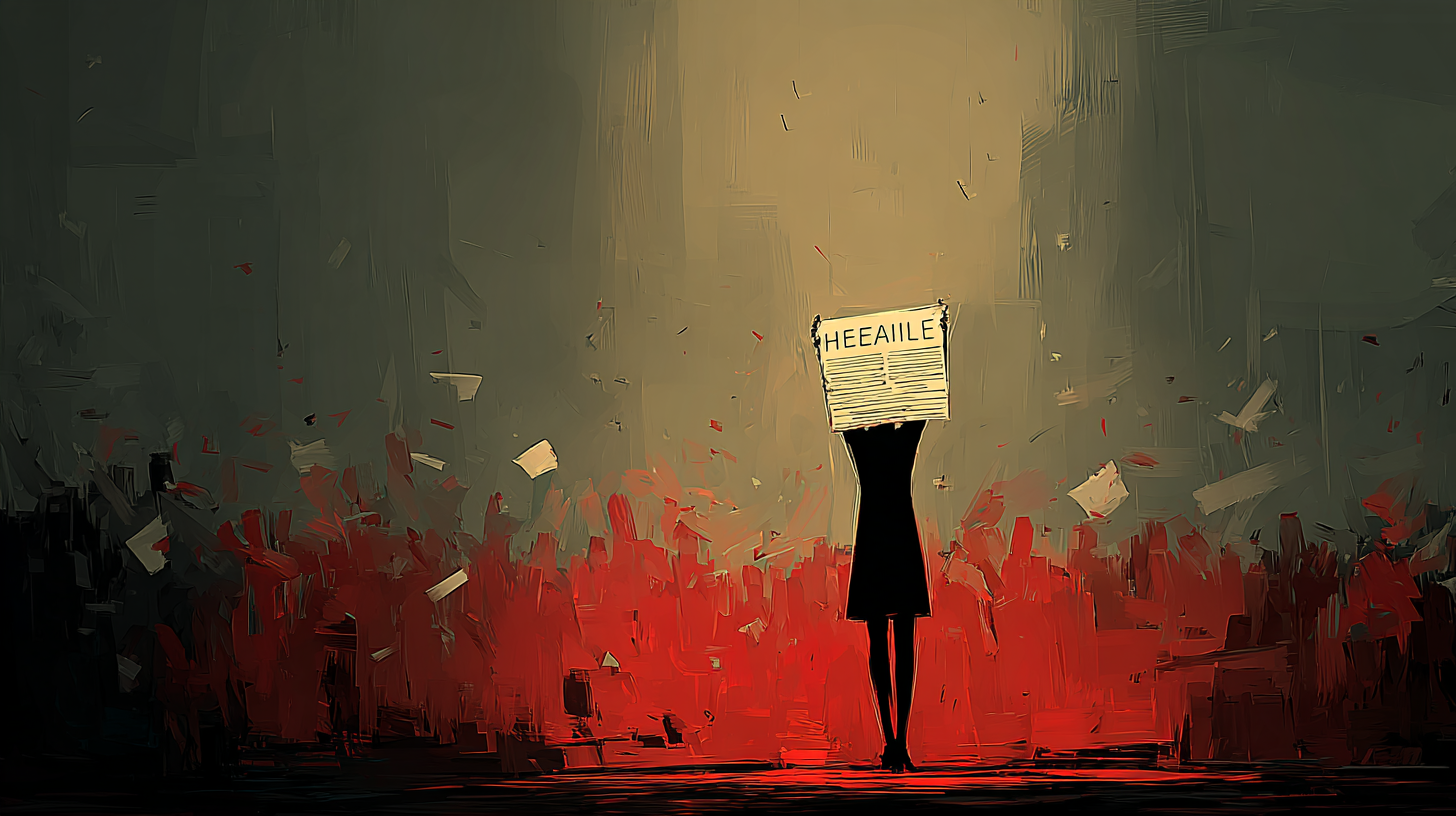“Headline” means the title of a news article or the main person in an event.
「headline」は、新聞や記事のいちばん上にあるタイトルや、イベントの主役を意味します。
以下は英単語 “headline” に関するストーリー型学習コンテンツです。まずは大枠の意味を理解して最後の文章で確認しましょう。
「headline」の主な意味(main meaning)
| 品詞 | 発音記号 | 意味(英語) | 例文(英語) |
|---|---|---|---|
| 名詞 | /ˈhed.laɪn/ | the title at the top of a newspaper article | The headline caught my attention immediately. |
| 動詞 | /ˈhed.laɪn/ | to be the main performer or focus of an event | She will headline the music festival this year. |
「headline」の語源(etymology)
出どころ:古英語の head(頭)+ line(行)
核イメージ:文章やイベントの「一番目立つ部分」「先頭に来るもの」
「headline」の類義語(synonyms)
| 類義語 | 例文 |
|---|---|
| title | The title of the article was too long. |
| heading | Please write the heading at the top of your paper. |
| caption | The caption under the photo explained everything. |
| banner | The banner read “Welcome Home!” |
| lead story | The lead story was about the new law. |
「headline」の反義語(antonyms)
| 反義語 | 例文 |
|---|---|
| footnote | The important detail was hidden in the footnote. |
| sidebar | The sidebar included some related news. |
「headline」のコロケーション(collocations)
| コロケーション | 例文 |
|---|---|
| make headlines | The scandal made headlines around the world. |
| front-page headline | The front-page headline was shocking. |
| grab the headlines | He grabbed the headlines with his brave rescue. |
| write a headline | Journalists must write a clear headline. |
| headline news | That story was headline news yesterday. |
「headline」の2項表現(binomials)
| 2項表現 | 例文 |
|---|---|
| facts and headlines | You need to check the facts and headlines carefully. |
| headlines and stories | Headlines and stories must match the truth. |
英語ストーリー(english story)
Title: Making Headlines
Emily was a young journalist working for a small local newspaper. One morning, she was assigned to write a headline (headline) for a story about a dog that saved a child from a fire. She knew this story could grab the headlines (grab the headlines). She wrote: “Brave Dog Rescues Boy from Flames.” It was short, strong, and clear — a perfect front-page headline (front-page headline).
Her editor praised the headline (headline) and made it the lead story (lead story) of the day. Emily felt proud. Later that week, a national paper picked up the story and used her exact words. Suddenly, Emily’s headline (headline) was headline news (headline news).
That weekend, Emily was invited to headline (headline, verb) a local journalism seminar for students. “You really know how to write facts and headlines (facts and headlines),” said her teacher. Emily smiled. She had finally made headlines (make headlines) — both in the paper and in her career.
和訳
タイトル:見出しを作る
エミリーは、小さな地方新聞社で働く若い記者でした。ある朝、彼女は、火事から子どもを助けた犬についての記事の**見出し(headline)を書くように任されました。この話は注目の見出しになる(grab the headlines)と彼女は感じました。彼女はこう書きました:「勇敢な犬、炎の中から少年を救う」。短く、力強く、わかりやすい——完璧な一面の見出し(front-page headline)**でした。
編集者はこの**見出し(headline)を褒め、この記事をその日の主な記事(lead story)にしました。エミリーは誇りに感じました。その週の後半、大手新聞社がこの記事を取り上げ、彼女の言葉をそのまま使いました。突然、エミリーの見出し(headline)が大ニュース(headline news)**となったのです。
その週末、エミリーは地元の学生向けジャーナリズムセミナーで**主役を務める(headline)ことになりました。「君は本当に事実と見出し(facts and headlines)の書き方を知っているね」と先生が言いました。エミリーは微笑みました。彼女は文字どおり、新聞にもキャリアにも見出しを作った(make headlines)**のです。
「headline」のQ&A
- Q「headline」と似た意味の「title」とはどう違いますか?
- A
「title」は本・レポート・映画など幅広く使われる「題名・タイトル」です。一方で「headline」は主に新聞や記事の見出しに使われ、ニュース性の強い情報に使われる傾向があります。
- Q「heading」と「headline」の違いは何ですか?
- A
「heading」は文書やセクションのタイトルとして使われます。一方「headline」は新聞やニュース記事の見出しで、読者の注意を引くためのものです。
- Q「caption」は「headline」と同じ意味ですか?
- A
いいえ。「caption」は写真やイラストの下に書かれる説明文です。「headline」は記事の上にある見出しです。
- Q「headline」の反対語として「footnote」があるのはなぜですか?
- A
「footnote」は本文の下にある補足的な情報です。つまり「headline」が最も目立つ情報、「footnote」は目立たない情報という対照的な関係にあります。
- Q「sidebar」はなぜ「headline」の反対語になりますか?
- A
「sidebar」は記事の横にある関連情報のコーナーで、主役ではありません。ニュース記事の中心である「headline」とは逆の位置づけです。
- Q「make headlines」はどんな時に使いますか?
- A
誰かが大きなニュースになったり、世間の注目を集めた時に「make headlines(見出しになる)」を使います。
- Q「front-page headline」とは何ですか?
- A
新聞の1面に載る見出しのことです。最も重要なニュースに使われます。
- Q「grab the headlines」と「make headlines」の違いはありますか?
- A
ほぼ同じ意味ですが、「grab the headlines」は意図的に注目を集めたニュアンスが強く、「make headlines」は自然と注目された時にも使われます。
- Q「write a headline」はどんな場面で使いますか?
- A
新聞記者や編集者が記事の見出しを書くときに使われます。「見出しを作る」という行動を示す表現です。
- Q「headline news」とは何ですか?
- A
最も注目されているニュースのことです。テレビや新聞で大きく取り上げられる内容です。
| 単語 | 日本語の意味 | 使われ方の特徴 | ニュアンス | かんたんな例文(英語+訳) |
|---|---|---|---|---|
| headline | (新聞などの)見出し/主役 | 新聞やネットニュースの大きな見出し。また、主役を務める意味も。 | 人の注目を集めるメインタイトルや人物に使う。 | That story made the headline.(その話は新聞の見出しになった。)The band will headline the festival.(そのバンドがフェスの主役を務める。) |
| heading | 項目の見出し/章のタイトル | 本やレポートなどの「小見出し」。章やパートを示すときに使う。 | 内容を整理するための「分類ラベル」的な感じ。 | The heading says “Chapter 1”.(見出しに「第1章」と書いてある。) |
| title | 題名/作品名/肩書き | 本・映画・記事などの名前全体。また、人の「役職・肩書き」にも使う。 | 正式な名前やラベルを示す。固有名詞にも使う。 | What’s the title of the book?(その本のタイトルは何ですか?) |
| caption | (写真などの)説明文・キャプション | 写真や図に添える説明文。SNSや記事内でも使われる。 | 見た目のものに情報を補足する短文。 | The photo had a funny caption.(その写真には面白いキャプションがついていた。) |
ニュアンスまとめ
- headline:新聞・ニュースの「注目の見出し」または「イベントの主役」
- heading:本・レポートの「章やセクションのタイトル」
- title:作品・人・本の「名前」そのもの。正式で広く使える
- caption:写真・図の「補足説明文」。SNSなどでもよく見る



コメント